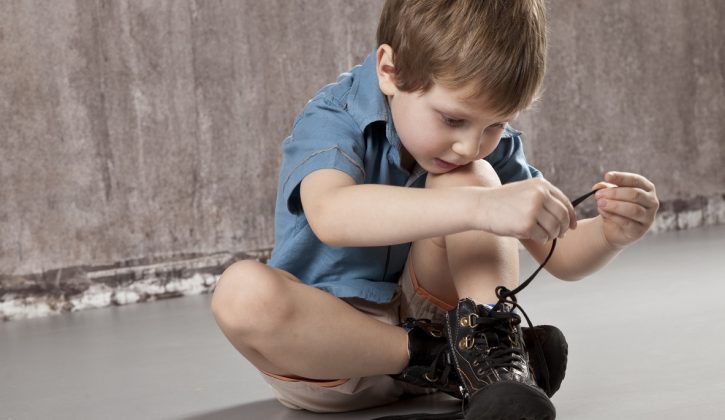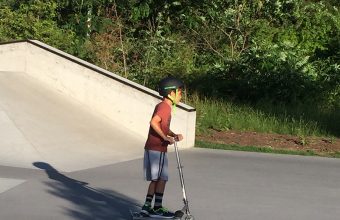With parents on speed dial and with independent thinking and acting at an all-time low, I can’t help but think that self-sufficiency has gone the way of the dinosaur.
I was at a friend’s birthday party the other week – an older friend with grown children of his own. It was a milestone birthday party and the children – now adults with kids of their own – were recounting favourite stories, pranks and escapades, all with the lens of maturity and experience.
The eldest daughter was describing how as a child she loved to climb trees – the higher, the better. Every day was a hunt for a new tree, a new adventure. One day she came to her father lamenting about a tree that she just couldn’t climb on her own, angling for some assistance. The father replied, “If you can’t climb that tree on your own, you aren’t ready to climb it yet.”
Those words clearly stayed with his daughter decades later, and they certainly stuck with me, too. Because how many of us would have helped our kids to climb the tree? How many times have we given a boost, tied a shoe, or assisted in any – and perhaps all ways? And sometimes that is good, and sometimes that is necessary. But perhaps – maybe, just maybe, this knee jerk reaction to help, soothe and do is more harmful than helpful to our kids.
As parents we want nothing more than for our kids to be safe, happy and looked after. Yet doesn’t “looking after” include teaching children how to do some things for themselves? As toddlers, they are pretty clear about that. “I do it myself!!” is a common refrain. Teaching babies to self soothe can be a sanity saver. But as kids get slightly older, and they’ve achieved the basic functions, I think we disregard the importance of self-sufficiency and autonomy, for a variety of reasons:
The sake of time: I would love to teach my kids how to cook a solid repertoire of meals, but often I find myself in a race against time without a buffer to teach and allow them to experience how to do it for themselves. This has led my kids to be able to prepare maybe three dishes, and even then there are some gaps in how to do it. I now know that I need to schedule in time to allow my kids to learn how to do things for themselves – cooking, taming hair, making beds, lunches, etc. The time input is worth the life skills they will develop.
Wanting to nurture: Yes, we love to take care of our kids. We want to erase every bad thing that has ever happened to them. We love to do things for them because that’s what our nurturing souls like to do. And from time to time, that’s ok. But when it becomes automatic and taken for granted, it’s not special anymore. It doesn’t teach the kids how to do things on their own. It does, however, cut into our own time and energy resources, perhaps leaving us with less time to nurture in others ways, such as by reading, getting artistic or being active together. What if we could fulfill our nurturing tendencies by doing basic chores and life skill things together, and then having quality time? There’s a much better chance that our kids will grow into teens that can manage their time, schedule their own appointments, and work their way into adulthood if we consider that approach.
Control freak tendencies: Raise your hand if you don’t ask your kids to fold and put away their own laundry because you want it done a certain way. Or if you’re convinced that no one else could ever learn to load the dishwasher the way you do. Yes – allowing kids to do their share of the tasks and chores associated with life means that you may have to let go of some control. As we say in our house, “it’s not going to get done to our exact standard” – but hey, it’s a start. How are they ever going to get better at folding, organizing or setting up playdates if we continually do it for them? It will get better. It’s not the end of the world. And if it really bothers you, redo it sometime when they can’t see.
Safety and health: We do a lot of things to keep our kids safe. We drive them places, discourage potentially dangerous activities, and do the risk analysis in our heads. But there are ways to take baby steps towards safe independence. The next time you are walking somewhere, resist the urge to lead and direct. Let the kids take turn providing the directions and make sure that they are walking one or two steps ahead of you so they’re not picking up on your body’s directional cues. Let the kids have “cook days” in which they plan and cook dinner – or, if you have time off in the summer, all three meals. Use general guidelines to keep it healthy and safe (e.g., meals must have two fruits and vegetables and a protein source. An adult must be present when the stove is in use). Soon your kids will be safer and healthier because these decisions become a part of their thinking process – not just as orders received from us.
Does it take time? Yes. A bit more planning? Sure. But that’s our job as parents – not just to nurture but to turn out young adults who have the thinking processes and problem-solving skills to succeed with whatever life coughs up – without resorting to parent speed dial. And being able to climb trees unassisted is even more rewarding.
Tagged under: kids,Parenting,raising kids,life skills for kids,self-sufficiency
Category: mom-101






